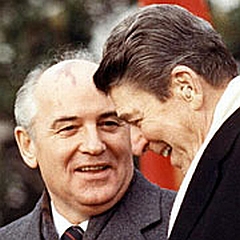
As many readers here well know, I’ve spent a good bit of time over the past decade studying US history. (In fact, over the past few years, I’ve occasionally helped my advisor keep a textbook up to date that recently drew the ire of right-wing blowhard Bill O’Reilly. Apparently, those damn pesky facts were somehow mitigating O’Reilly’s ability to spew forth the usual idiotic blather.)
Anyway, over that period of time, I believe I have in fact learned me a few things. So, as a public service of sorts, and because, after this morning’s revelations, I’ve reached the limit of craven and/or patently stupid falsehoods that I can feasibly ingest over so short a time, some “U.S. History for Dummies.” I expect most everyone who comes by this site with any frequency knows all this, but ya never know. Apologies for the didacticism in advance — if this were this a Coors Light commercial, this would be where i vent. (And thanks to Lia for the timely visual tax lesson, above.)

At any rate, as most people remember from high school, the original 1773 Tea Party was not a protest against high taxes or high prices at all. (In fact, legally imported tea — i.e. that of the East India Company, which was both suffering serious setbacks over in India and losing market share to smuggled Dutch tea at the time — was actually cheaper in the colonies after the Tea Act, since it was now exempt from the usual obligations.)
In small part a reaction of the East India’s commercial rivals to this sweetheart deal, the Boston Tea Party was mainly held to uphold the principle of No taxation without representation. Which I don’t think I need to explain. So, with the minor exception of DC-area conservatives who attended the tea gathering in Washington (without crossing over from Virginia or Maryland), the, uh, “teabaggers” don’t really have a leg to stand on here. This is particularly true after you consider that both ruthless gerrymandering and the vagaries of the Electoral College (I’m looking at you, Wyoming) actually tend to lead to over-representation of conservative Republicans in our halls of governance, even despite heavy losses for the “Grand Old Party” in 2006 and 2008.
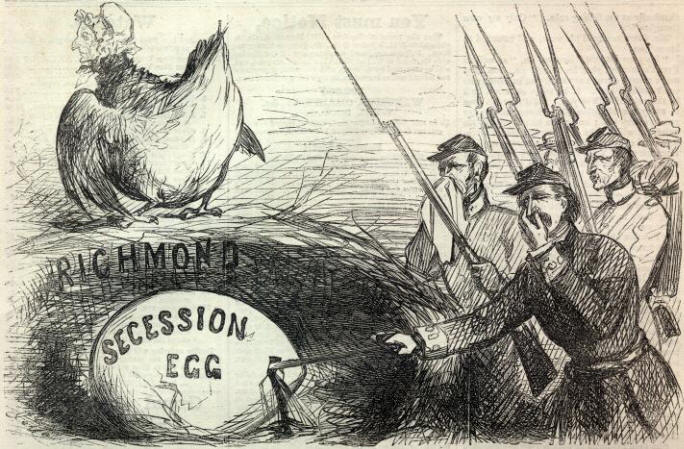
Well, in fact, no state in the Union has any legal right to secede. (Not even Texas.) The existence of such a right was posited and debated quite often in the early years of the republic: by Jefferson and Madison in the Virginia and Kentucky resolutions, by the members of the Hartford Convention, by South Carolina’s philosopher-politician John C. Calhoun, and countless others.
But the illegality of secession was eventually confirmed — in blood — when eleven states attempted to pull out of the Union in 1861, due mainly to differing opinions on the institution of slavery and its expansion into the western territories. As a result of this insurrection by the southern states, a violent conflict broke out, which we call the Civil War. It lasted four years, and it was kind of a big deal.
Prior to the war, the states of the Confederacy believed secession to be their natural right, while those remaining in the Union believed it to be tantamount to an act of treason. With the Union victory in that conflict, and the subsequent readmittance of southern states in such a manner that reaffirmed that no right of secession exists, the question was settled. So it remains to this day.

Another argument we’ve heard lately — today Sen. McCain made it with his usual comrades-in-arms, Sens. Lieberman and Graham, while trying to protect Dubya’s lawyers — is that the CIA officials who actually conducted these recent acts of torture should be exempt from prosecution, because they were following the legal dictates of those higher-up in the administration. (To follow the reasoning around the circle, the torturers should be exempt because they were listening to the lawyers, and the lawyers should be exempt because they didn’t do the actual torturing. Cute.)
Anyway, whatever you think of the merits of this argument, this is usually referred to as the Nuremberg defense, and it is in fact no defense at all. Argues Principle IV of the Nuremberg Principles, devised by the Allies after WWII to determine what constituted a war crime: “The fact that a person acted pursuant to order of his Government or of a superior does not relieve him from responsibility under international law, provided a moral choice was in fact possible to him.” Insert “CIA interrogator” for person in that last sentence and you can pretty much see the problem.
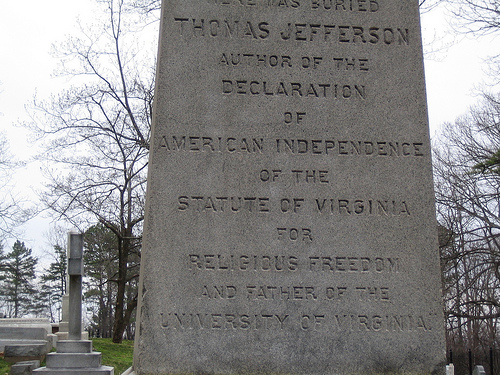
America is not a Christian nation. This will be patently obvious to anyone who’s ever heard the phrase “separation of church and state.” Unlike, say, England, America does not have and has never had an official, established church. This is very much by design. For proof of this not-very-radical claim, see the very first clause of the very first amendment to the Constitution: “Congress shall make no law respecting an establishment of religion, or prohibiting the free exercise thereof.”
If that doesn’t do it for you, see George Washington’s famous 1790 letter to the Jewish residents of Newport, Rhode Island. “May the Children of the Stock of Abraham, who dwell in this land, continue to merit and enjoy the good will of the other Inhabitants; while every one shall sit under his own vine and fig tree, and there shall be none to make him afraid.“
Or consider that Thomas Jefferson skipped his presidency on his tombstone to make room for his authorship of the Virginia Statute for Religious Freedom: “Be it enacted by the General Assembly, That no man shall be compelled to frequent or support any religious worship, place, or ministry whatsoever, nor shall be enforced, restrained, molested, or burdened in his body or goods, nor shall otherwise suffer on account of his religious opinions or belief; but that all men shall be free to profess, and by argument to maintain, their opinion in matters of religion, and that the same shall in no wise diminish enlarge, or affect their civil capacities.” (We could also make mention of the Jefferson Bible, but let’s start slow.)
Is the reasoning here too circuitous for Rove, Gingrich, et al to follow? Ok, then, here’s the cheat sheet: the 1797 Treaty of Tripoli, passed by a Congress of our Founders without declaim and signed into law by President John Adams. It begins: “As the Government of the United States of America is not, in any sense, founded on the Christian religion…” Did y’all catch it this time? Good, let’s move on.
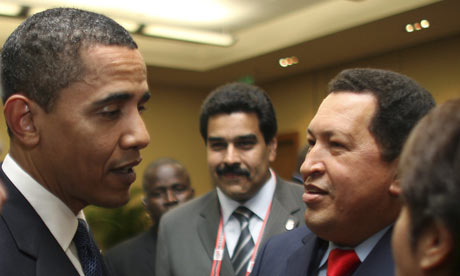
After the picture was taken, conservatives went predictably livid, with Matt Drudge headlining the offending photograph with the usual red text, Dick Cheney deeming Obama “a weak president” on FOX News, and Gingrich arguing that it made Obama look “weak like Carter.” “We didn’t rush over, smile and greet Russian dictators,” said Newt, and he wasn’t the only potential 2012’er aghast at Obama’s behavior. Sen. John Ensign of Nevada called the president “irresponsible” and the consistently shameless Mitt Romney painted Obama a “timid advocate for freedom”.
Um, ok. Well, let’s see here…
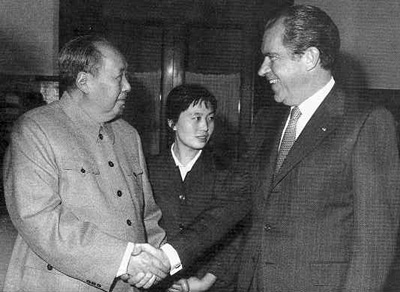

I could go on. With regards to that last one — Reagan yukking it up with Mikhail Gorbachev, then of “the evil Empire” — it didn’t take long before (surprise) Newt was caught in a contradiction. Apparently, Gingrich had previously argued on his website that Ronald Reagan’s good humor with Gorby was a sign of strength, not weakness.
Speaking of which, as Lawrence O’Donnell noted on MSNBC the other day, saintly old Ronald Reagan didn’t just smile and shake hands with America’s enemies. His administration sold them weapons under the table. So, please, assorted puddin’-heads of the GOP talkocracy, spare me your warmed-over tripe about poor diplomacy and weak leadership. As with everything else above, I’ve swallowed enough of your swill over the past few weeks to last me a lifetime.


